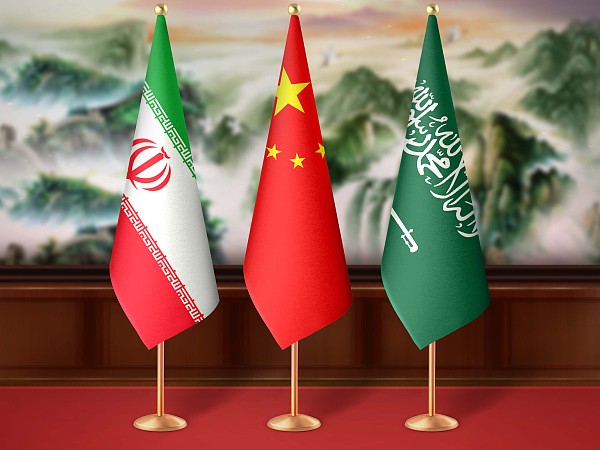China's détente in the Middle East aims to bring peace
- By Jin Liangxiang
 0 Comment(s)
0 Comment(s) Print
Print E-mail China.org.cn, March 21, 2023
E-mail China.org.cn, March 21, 2023

[Photo/VCG]
On March 10, China, Iran, and Saudi Arabia issued a joint statement saying that Iran and Saudi Arabia would resume diplomatic relations within two months. While this piece of news was worthy of occupying the front pages of most international media organizations, it is the détente itself and the model of China's mediating efforts that will produce profound long-term structural implications on the Middle East.
First, de-escalating tensions between Iran and Saudi Arabia will further enhance the region's trend toward peace. Rivalry or competition for geopolitical influence between Iran and Saudi Arabia has been one of the defining features of regional tensions for decades, which has spilled over to the entire region, including Syria, Lebanon, Iraq, Bahrain, and Yemen. The détente between the two is expected to de-escalate tensions on all fronts across all parts of the region.
According to reports, Ali Shamkhani, the secretary of Iran's Supreme National Security Council, already traveled to the United Arab Emirates (UAE) on March 16 at the invitation of his Emirati counterpart to discuss bilateral relations, while an Iranian parliamentary delegation visited Bahrain and expressed the wish to open more horizons of cooperation. Hopefully, the détente will also pave the road for negotiated solutions and re-engagement between other hostile parties, from Yemen to Iraq, Lebanon, and Syria.
The last couple of years has seen improved interactions between all major regional actors, including Iran, Saudi Arabia, and Turkey, except Iran and Israel. The détente reflects the desire of the region's people for peace and development, a trend that will hopefully be further facilitated by the Iran-Saudi détente.
Second, the détente looks to reduce tensions regarding the Iran nuclear issue. Tensions related to the Iran nuclear issue have mainly caused concern among three distinct parties, namely, U.S.-European countries, Israel, and the Gulf countries led by Saudi Arabia. As a result of the détente, the pressure surrounding the nuclear issue will be greatly reduced as the issue largely pertains to anxieties related to Iran's nuclear program.
In addition, the U.S. might feel that it is losing control of the Middle East agenda and, thus, will hopefully revive its efforts to negotiate with Iran and even adopt reasonable positions on the issue, which could serve to further reduce tensions.
Third, the détente may lead to a change in regional agendas. There are various confrontation hotspots in the Middle East, among which the Palestine and Iran issues are but two. But Israel and the U.S. have intensified their efforts to build the Iran threat into a major issue in the region over the last decade, which led to the construction of an anti-Iran alliance and marginalized the Palestine issue.
Judging by the fact that the Palestine issue is still particularly relevant to regional security, it should not be marginalized and should not be ignored by the international community.
The détente, despite needing further consolidation, looks to pave conditions for degrading the Iran agenda, which should be a positive for the world and bring the Palestine issue back to the fore, hopefully serving to maintain peace in the region.
Fourth, the détente may encourage regional actors to further strengthen their strategic autonomy. Gulf countries have demonstrated their efforts to pursue strategic autonomy in the last decade. In 2011, Saudi Arabia dispatched troops to help Bahrain to pacify its domestic turmoil; Gulf countries have been actively involved in the Syrian issue; and Saudi Arabia organized a coalition to intervene in Yemeni affairs in 2015.
Successful or not, these moves indicate that the Gulf countries will become more reliant on themselves for security issues within the context of America's decline and reluctance to guarantee these countries' security. Saudi Arabia's efforts to accept China's mediation and to reach a détente with Iran signals a move toward their strategic autonomy after having sought an approach independent from looking to the U.S. for security. The move will further strengthen its resolve for strategic autonomy as well as give them a reason to believe that a détente via diplomacy can serve its security.
Jin Liangxiang is Senior Research Fellow with the Center for West Asian and African Studies, Shanghai Institutes for International Studies. For more information please visit:
http://www.keyanhelp.cn/opinion/jinliangxiang.htm
Opinion articles reflect the views of their authors, not necessarily those of China.org.cn.
If you would like to contribute, please contact us at opinion@china.org.cn.





